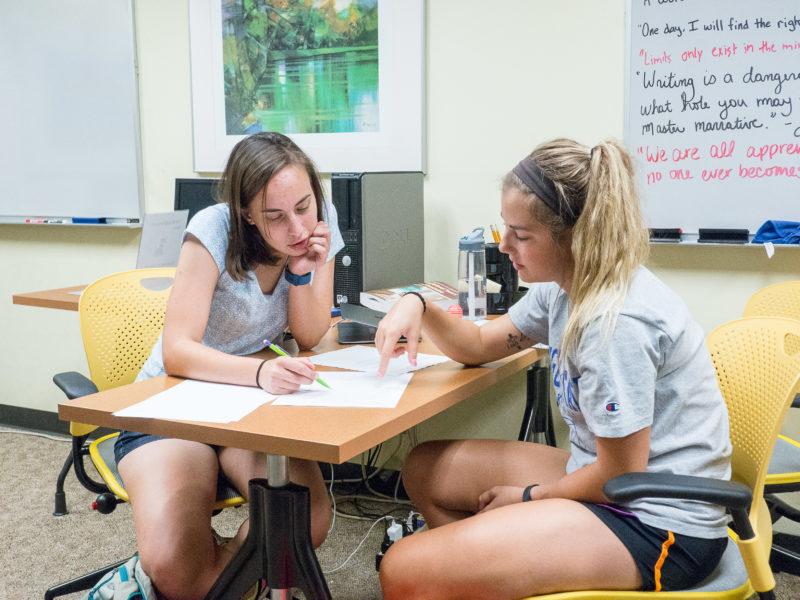College students across the country can be expected to write an abundance of rigorous essays on various topics throughout their academic career. To help prepare them for the vast amount of papers they’ll be writing, first-year students are required to enroll in writing-heavy FYE courses. Several outlets are available to provide assistance to concerned or struggling students with their writing skills, especially as they tackle their first collegiate papers. One of these sources, the Writing Center, began revamping their program shortly after the start of the FYE program. Many students took advantage of new offerings and found them beneficial.
“The FYE was a challenge for many students,” said Jennifer Rowe, professor of English and director of the Writing Center. “It was a lot of writing. We had a lot of students who needed some further guidance.”
The positive reception of these special sessions prompted Rowe to continue offering additional workshops throughout the 2016-17 school year for students who hope to receive some more assistance on their written assignments.
“We planned four evening skills workshops for the fall and we’ll do another four or five in the spring,” Rowe said. “The goal is to expand it simply beyond a place to get walk-in tutoring.”
Rowe took over the Writing Center two years ago. Since taking command of the service, she has aimed to make it a bigger presence on campus while also finding the best possible methods to help students at all levels of writing.
“I believe that the Writing Center shouldn’t simply be a place to support struggling writers or writers who need help,” Rowe said. “It should also be a place that supports really good writing.”
The Writing Center currently employs five students who are trained to help students at all levels of writing and through various stages of their essays, from brainstorming to editing full drafts.
“Being a writing tutor doesn’t simply mean proofreading everything and checking for every grammatical mistake,” said Samantha Heffner, senior English and history major and tutor at the Writing Center. “Rather, we look at the paper as a whole, help them structure their ideas and encourage them to come up with ideas.”
Heffner served as an FYE peer tutor last year for HUMA: Great Books of the Ancient World, in which she helped students to develop their ideas and write essays on an abundance of some of the major classical texts such as the “Iliad.”
“I think my biggest piece of advice is to go to your peer tutor and professor and talk to them,” Heffner said. “For your FYE, definitely make use of your peer tutor because they’re there to help you. As for writing, read and reread. Writing is rewriting.”
All of Trinity’s FYE professors are working to ensure that students thoroughly enjoy their First Year Experience and learn as much as possible from their experience.
“My coordination of the FYE has been made a pleasure by the individual FYE course coordinators, who have beautifully orchestrated these courses along with our FYE colleagues, and by the endlessly supportive university administration,” said Willis Salomon, professor of English and coordinator of the First Year Experience program. “The FYE has been a collaborative effort of the best kind, one in which individual faculty, academic departments and university administrators all work effectively toward a common curricular goal.”
Salomon ultimately believes that all the various First Year Experience classes will benefit students through a focus on key skills.
“By emphasizing writing, reading and critical thinking, as well as providing opportunities for experiential learning (research, internships, international study, etc.), the FYE offers solid preparation for the student’s chosen major and life’s work,” Salomon said.
Trinity’s Writing Center has made several significant changes that will allow students in FYE and beyond to get more help with their various writing assignments.
“We now are going to offer the opportunity to schedule an appointment as opposed to drop-in,” Rowe said. “In addition, we now have a faculty resources page, so if a faculty member is concerned that maybe a student isn’t keeping up with the demands of writing in that particular course, he or she can send me a note through the website telling me to reach out to this person.”
Rowe aspires to help students see writing in a more positive light, rather than a challenge or activity to be feared.
“What we like to do at the Writing Center is to train students to look at writing as a process, not as something that needs to be fixed,” Rowe said.
The Writing Center is open for students to visit with questions six days a week, from Sunday to Friday. It is located in Room 319 of Coates Library, right near the help desk. Jennifer Rowe and the tutors hope that students will come regularly for individual appointments and that the special workshops continue to be well-attended. A list of available hours for each tutor can be found on the Coates website. Students with further inquiries are encouraged to reach out to Rowe for assistance and advice on the best approaches to writing their various papers.







